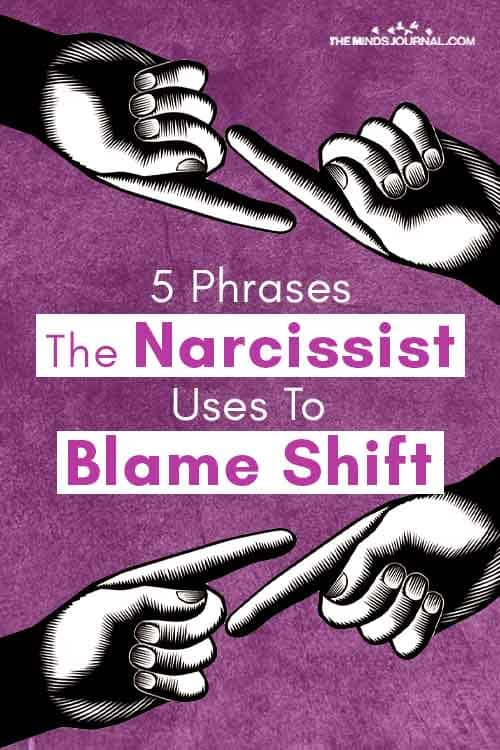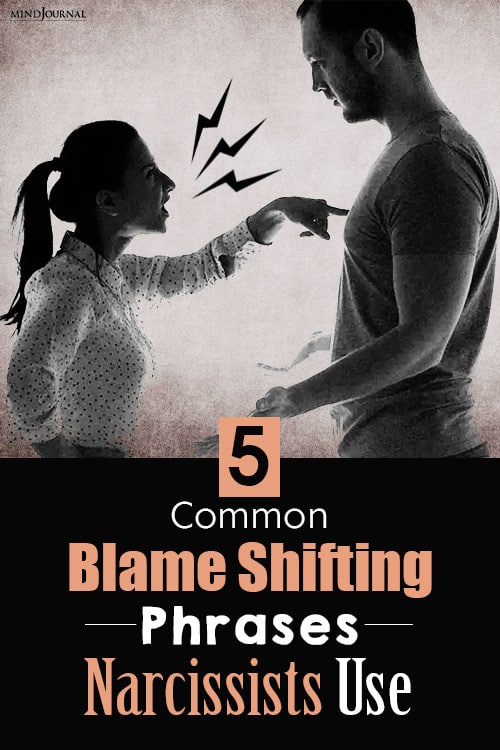Narcissists never hold themselves accountable for any mistakes in their life or relationships, rather they are prone to place the blame on others. Here are 5 common phrases a narcissist use skillfully to blame shift and manipulate you. Read on to know what does that means and why they are used.
It is fundamental that we remain unaccountable for our actions. One of the most effective ways of avoiding this accountability, provoking you and leaving you exasperated and stunned is to engage in blame-shifting. We are the blame shifters who will always use this form of manipulation in our ceaseless quest to maintain the upper hand.
Not only is it the case that we believe we are entitled to complete immunity for what we say and do, occasioned by our innate superiority, we also believe it to be necessary for us to be able to gather fuel as often and as effectively as we do.
If we were slowed down by having to make meaningful apologies, explain ourselves, account for what we have done, and accept responsibility for the consequences this would absorb time that would be far better spent in the pursuit of fuel. Hampering us in such a way would result in us becoming weaker since we would not be able to gather as much fuel as usual.
It is, therefore, necessary, so we remain sleek, effective and light of foot, for us to never be concerned about accountability and also to never allow responsibility to rest with us.
As with many of our machinations, this approach also allows us to gather fuel in itself by the imposition of the blame on others, usually you, and the astonished and outraged emotional response which then flows from this staggering act of walking away scot-free. As ever, words are our best allies when it comes to throwing off the attempt to make us assume the mantle of responsibility.
Here are five of our favorite narcissist blame shift phrases
1. What do you expect me to do about it?
A delicious subtle piece of narcissist blame-shifting to begin with. We do not even state that we regard it as your fault, your responsibility, or your liability with this question.
Nevertheless, the implication is clear – we expect you to do something about it because we do not ‘do’ responsibility, your role is to clear up after us and you signed up to that role when you accepted our overtures. Did you miss that term of the contract? Don’t blame us, that’s your own fault.
Related: 5 Types of Blame Shifting by Narcissists
I regularly brag about how brilliant and special I am. That I have many talents and if I so chose I could remedy many situations within moments, but not withstanding this being the stance that I adapt to the world at large, I am not going to do that with you. Not a chance.
I am not here to pick up the pieces after you, although I expect you to do so for me repeatedly. I can do as I like and you are obliged to make good the damage that I cause – collect the broken pieces of crockery, apologize to the shell-shocked friend after an outburst, try to solve the financial headache that we have left.
If you have caused a problem, and let’s face it, it is always your fault anyway, you cannot expect me to do something about it. I am above such menial tasks. I have important and bigger things to attend to. Such as? I don’t have to explain myself to the likes of you. If I caused the problem (which in reality is usually the case) I am not going to do anything about it.
2. Deal with it.
That’s the way it is and you had better get used to this narcissist blame shift phrase. This haughty declaration is par the course for our sense of entitlement to do as we please. We bulldoze through everything and you just have to put up with it. You can’t walk away; we will not allow that to happen.
Issuing this barked instruction at you is an effective way of upsetting you. It is telling you that you are useless and you should just be getting on with the situation rather than complaining about it. You shouldn’t be complaining; you should have already guessed that you needed to sort the situation out. Don’t ask me for help because I just do not have time for this mickey mouse nonsense.
Related: Do Narcissists Ever Feel Sorry?
3. You caused this to happen.
We like to maintain that we act with the omnipotence of a god but how many times have you found that you have somehow caused something to happen so that it would suggest that you exercise the powers of a deity? My late arrival was down to you. My failure to remember something was caused by you. My infidelity for the sixth time was whole as a consequence of what you have done.
At its most brutal this declaration is issued without any explanation as to why it is that you caused the problem to arise. We say that it is the case therefore that must be right. Does this exchange seem familiar?
“Why is that the case?”
“It just is.”
“But why?”
“Because I say so.”
Other than our kind, who comes out with such assertions bereft of reality or explanation? That’s right, children. That tells you all you need to know about our mentality when we accuse you of being the one who has caused the problem.
If you are “fortunate” enough to be given some kind of explanation it makes perfect sense when viewed from our perspective, although it will not from yours. That is deliberate.
We want you to feel astonished, bewildered, and annoyed at our sheer audacity to make the connection between our wrongdoing and your causation.
Related: Beware Of Projection: A Blame-Shifting Tactic Of The Extreme Narcissist
“If you were more loving I wouldn’t go elsewhere.”
“What do you mean by that? I couldn’t be any more loving towards you.”
“Oh that’s right, deny it is anything to do with you and make me out to be the bad person.”
“Well, it is you who had the affair.”
“Caused by you.”
“How?”
“I have already told you and if you cannot accept that then there is no point continuing with this conversation.”
You get no answer no acceptance of blame. All you get is a tenuous (in your world but not ours) explanation as to why our wrongdoing is all down to you.
4. Why do you have to spoil everything?
A cousin of the third shirking above but with an added layer of blame. In the above example of narcissist blame shift, you have caused the problem although you may not necessarily have intended it. With this statement, we are telling you that not only is the problem not of our doing, but it also is your fault, and guess what?
You meant to do it because you are such an awful and horrible person. Our rampant paranoia causes us to believe that you are out to get us, to topple us and that you are plotting to unseat us as a consequence of our behavior towards you during devaluation. This is why whenever anything goes wrong you are the architect of that misfortune as you have purposefully set out to cause a problem for us, driven by your innate nastiness and jealousy.
Related: Can A Person With Narcissistic Personality Disorder (NPD) Have A Good Marriage?
5. Why do you make my life so hard?
Poor us. Put upon by you and your terrible behaviors. This is another popular narcissist blame shift phrase, often thrown at you when you begin to wise up to our manipulations, and either through choice or out of sheer exhaustion you are no longer engaging with our provocations and machinations. What we are actually saying to you here is, “Why do you make it so hard to extract fuel from you?”
Your failure to play ball and do what we want is causing us to expend more energy in order to get the negative fuel from you and in accordance with our outlook as a victim, you are doing this on purpose.
We need to get that fuel and you should be helping us, not hindering us, no wonder we lash out at you as we do because you are horrible and you make our lives far more difficult and harder than you should or once did.
Understand more about Blame Shifting here
Have you ever experienced a narcissist blame shift? Could you relate to the article? Leave a comment below.
Watch this video to know more about narcissist blame shifting guilt-tripping tactics:
Written by: HG Tudor Originally appeared on: Narcsite












Leave a Reply